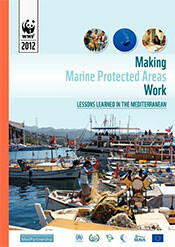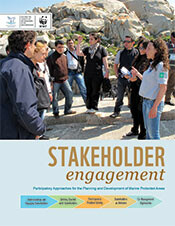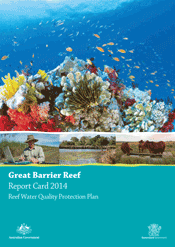Making Marine Protected Areas Work: Lessons Learned in the Mediterranean
 Early engagement with local communities and regional and national officials are essential to the capacity and efficiency of marine protected areas (MPAs). This WWF MedPAN South report, along with the Marine Protected Areas: Guiding Principles and Benefits newsletter, identifies lessons learned in case studies from five countries with MPAs in the southern and eastern Mediterranean. Published in English, French, and Arabic, this report is an important tool for managers worldwide who want to make their MPAs fully functional and effective.
Early engagement with local communities and regional and national officials are essential to the capacity and efficiency of marine protected areas (MPAs). This WWF MedPAN South report, along with the Marine Protected Areas: Guiding Principles and Benefits newsletter, identifies lessons learned in case studies from five countries with MPAs in the southern and eastern Mediterranean. Published in English, French, and Arabic, this report is an important tool for managers worldwide who want to make their MPAs fully functional and effective.
Participatory Approaches for the Planning and Development of Marine Protected Areas
 This report was created through the WWF/NOAA Capacity Building Partnership within the MedPAN South Project. The participatory engagement of stakeholders is perhaps the most important component of the planning and development of a Marine Protected Area. Meaningful engagement depends on the ability of practitioners to build a healthy, lasting, and trustful relationship with stakeholders, including local communities. The approaches described in this guidebook are intended to help practitioners navigate this process.
This report was created through the WWF/NOAA Capacity Building Partnership within the MedPAN South Project. The participatory engagement of stakeholders is perhaps the most important component of the planning and development of a Marine Protected Area. Meaningful engagement depends on the ability of practitioners to build a healthy, lasting, and trustful relationship with stakeholders, including local communities. The approaches described in this guidebook are intended to help practitioners navigate this process.
A Special Session on Report Cards
 IAN, the Queensland Government Department of Environment and Heritage Protection, and Healthy Waterways are hosting a joint session on ecosystem health report cards. The session will highlight key advances in report card development, including: evaluation of pressure, state, and response status; social, economic, and environment indicators; and the importance of process in engagement of stakeholders. We will illustrate these advances through examining the Great Barrier Reef Report Card, Healthy Waterways Report Card for Southeast Queensland, and report cards for the Mississippi River, Willamette River, and a new Global Partnership between WWF and the University of Maryland Center for Environmental Science.
IAN, the Queensland Government Department of Environment and Heritage Protection, and Healthy Waterways are hosting a joint session on ecosystem health report cards. The session will highlight key advances in report card development, including: evaluation of pressure, state, and response status; social, economic, and environment indicators; and the importance of process in engagement of stakeholders. We will illustrate these advances through examining the Great Barrier Reef Report Card, Healthy Waterways Report Card for Southeast Queensland, and report cards for the Mississippi River, Willamette River, and a new Global Partnership between WWF and the University of Maryland Center for Environmental Science.